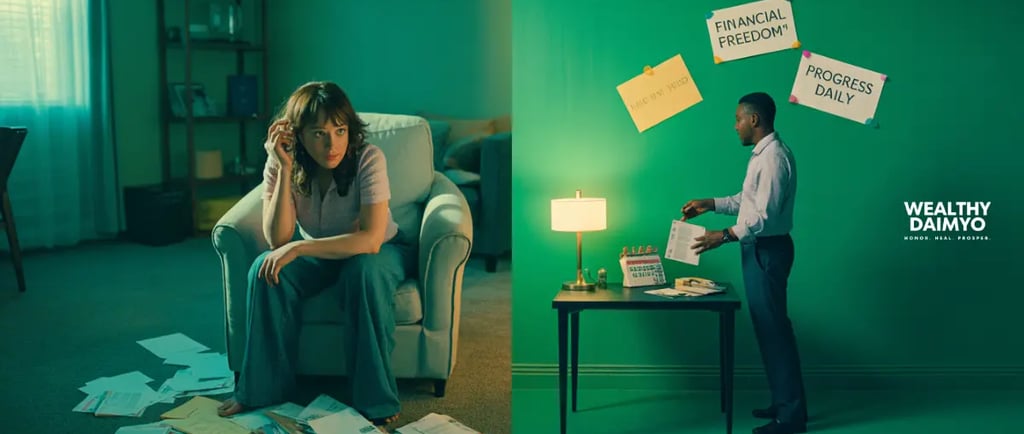Why Financial Recovery Feels So Lonely (And What to Do About It)
Understanding the silent pain behind rebuilding your money and your self-worth
Wealthy Daimyo
3 min read


There’s a quiet kind of pain that no one talks about — the loneliness that comes with trying to rebuild your life financially.
Not after a dramatic bankruptcy, not after going viral for your downfall, but in the still, private spaces where you’re trying to piece your money story back together in silence. The rent still needs paying. Groceries still need to be stretched. But inside, you feel like you’re trying to rewrite your entire identity — and no one even sees it.
People assume that once you're "doing better financially," everything must be fine now. But they don’t see how every purchase still feels like a moral test. They don’t see you choosing generic brands not just to save money — but because your nervous system is still wired to feel guilt every time you want more. They don’t know that even though the crisis is technically over, you're still waking up with the same survival thoughts that once helped you cope.
The Invisible Isolation of Financial Healing
What makes financial recovery feel so isolating is that it's not dramatic enough to explain, but too painful to ignore.
No one throws you a party for improving your credit score. No one claps when you say no to brunch because you’re rebuilding your emergency fund. These wins are quiet. Personal. Internal. And in a world that rewards loud success, that kind of invisible progress can feel incredibly lonely.
You start to notice how few people understand your boundaries. When you stop overspending, some friends feel judged. When you stop offering to cover others, some feel betrayed. Suddenly, your growth makes others uncomfortable — and the result? You shrink your truth to avoid tension. You fake being “fine” to protect their comfort. You smile when you want to cry.
That emotional dissonance is where the real suffering happens — not in the money, but in the silence.
Why Loneliness Hurts More During Financial Recovery
When you're broke, at least people expect you to be down. But once you're rebuilding, society expects you to “move on.” The empathy dries up. The offers of help disappear. The internal war you're still fighting becomes invisible. And this gap between what people see and what you feel becomes a form of self-erasure.
Loneliness during financial recovery isn’t just about being alone — it’s about being unseen.
It’s about feeling like the world has moved on while you’re still carrying pieces of your past with you. It’s about having no one to celebrate the small wins with, and no one to talk to about the emotional cost of trying to live differently.
It’s even more painful when your past financial self was generous, reckless, or “fun” — and now you’re the quiet one, the cautious one, the person who thinks twice before every transaction. People miss the old you. But they don’t realize that version of you almost broke completely.
You’re Not Wrong. The System is Designed This Way.
One of the deepest truths about financial recovery is this:
The system doesn’t want you to heal — it wants you to hide.
Because when people feel ashamed of their money past, they stay quiet. And when they stay quiet, they don’t disrupt anything. They don’t speak up about predatory lending. They don’t talk about financial abuse. They don’t tell their story, and so the cycle repeats — generation after generation.
But Wealthy Daimyo exists for one reason: to break that silence.
To remind you that your healing journey is not shameful. It's powerful. It's worthy of honor. It's worthy of space. And it's desperately needed in a world that teaches us to perform wealth instead of healing from financial trauma.
What to Do When Financial Healing Feels Like Isolation
If you’re in this space right now — rebuilding your money, rewriting your habits, and trying not to drown in emotional silence — here’s what you can do:
1. Stop apologizing for setting boundaries.
You are not selfish for saying no to spending that doesn’t align with your healing. You're wise.
2. Create rituals for your quiet wins.
You may not get applause, but you can honor yourself. Light a candle when you pay off debt. Write a note to your future self when you save $50. It matters.
3. Build a new emotional language around money.
This is where most people stay stuck — using shame as a motivator. But you can learn to use compassion instead. It will take time, but it will stick deeper than guilt ever could.
4. Connect with people on the same path.
Your healing deserves community — not pity, not judgment. At Wealthy Daimyo, our Premium eBooks and Healing Tools were created specifically for this emotional-financial gap. You’re not alone, even if it feels like it.
Final Words: Quiet Strength Is Still Strength
Your journey isn’t small because it’s quiet.
Your strength isn’t lesser because it isn’t loud.
You’re rebuilding something sacred — your relationship with yourself, your money, and your future. And that deserves more than silence. It deserves recognition, respect, and a space where healing is celebrated.
And that’s exactly what we’re building here.
Let’s Connect
contact@wealthydaimyo.store
Whether it’s a question, collaboration, or a moment of financial truth — we’re here.
Protected under DMCA and registered with ProtectMyWork.com.
No part of this site may be copied or reproduced without written consent.
© 2025 Wealthy Daimyo. All rights reserved.
